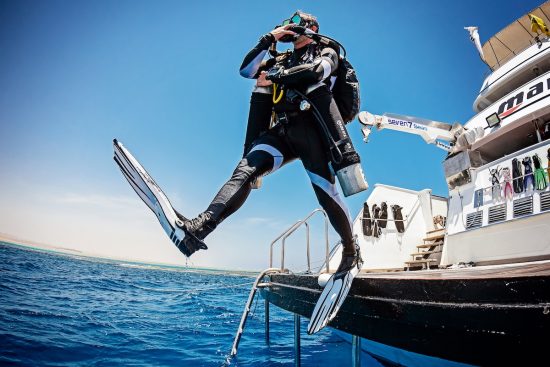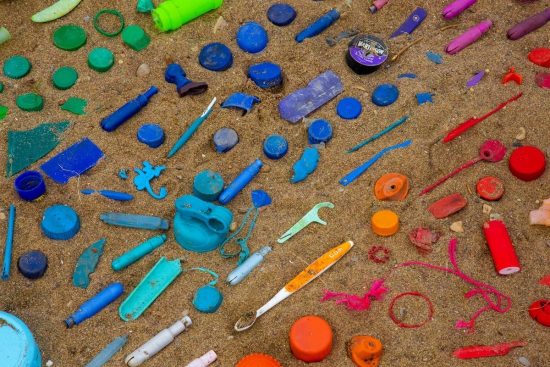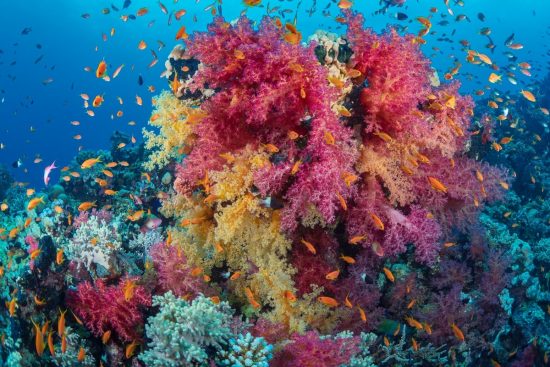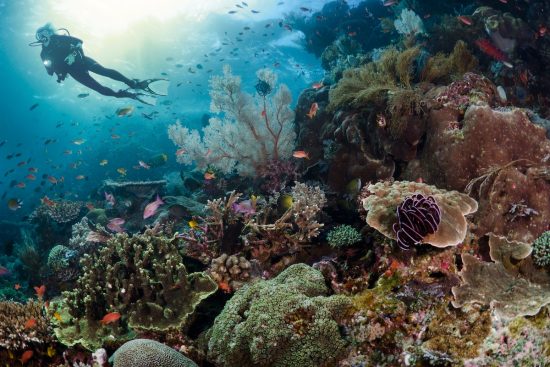Whether you are diving close to home or venturing overseas, there are many easy ways you can become a more environmentally friendly diver and protect the oceans from harm. With simple switches to everyday items and smart travel choices, you can make a difference that lasts and protect the dive sites you love. Read on to find out more and get inspired with 7 easy ways to be an eco-friendly diver.
1. Support eco-conscious dive operators
Supporting sustainable tourism operators is one of the easiest ways to be an eco-friendly diver. With little effort on your part, you can support other people working hard to keep our oceans clean and healthy.
There are innovative, eco-conscious tourism operators around the world, including plenty of sustainable dive operators and resorts. Not sure where to start? Most companies are keen to share their eco-credentials and often list them in the ‘about’ sections of their websites.
Keep an eye out for companies who do some or all of the following:
- Are carbon neutral or support carbon-offsetting schemes.
- Conduct beach and dive site clean-ups.
- Have a recycling scheme and minimize their use of water.
- Give back to their local community.
- Run marine conservation events for their community and local schools.To make life even easier, simply choose your destination and book your dives with a Blue Oceans Center. Blue Oceans Centers are firmly committed to protecting the oceans and involve their staff and customers in environmental awareness.
2. Use reef-safe sunscreen
Many chemical sunscreens contain ingredients that are thought to cause coral bleaching, which can cause the loss of entire coral reef ecosystems. There are many chemical sunscreen ingredients to avoid, including:
- Oxybenzone
- Octinoxate
- Octocrylene
- Parabens
- Triclosan
Do your body and the oceans a favor by switching to reef-safe sunscreen instead. Reef-safe sunscreens don’t contain ingredients that are known to harm corals or other marine life, making them a smart choice for any eco-friendly diver. Popular reef-safe sunscreen brands include Stream 2 Sea, MooGoo, Raw Elements USA, Badger Balm and Raw Love. You can also get reef-safe haircare products from Stream 2 Sea and MooGoo.
3. Say no to plastics
It’s easier now more than ever to say no to plastics and choose sustainable alternatives instead. If you already have a reusable water bottle and jute bags, great! These are the next eco-friendly items to invest in for your diving days and travels:
- Stainless steel travel mug.
- Ceramic or bamboo flask for hot drinks after cold winter dives.
- Metal or bamboo eco-cutlery set.
- Bamboo straws.
- Plastic-free shampoo and conditioner bars.
They don’t cost a fortune and they also don’t cost the earth.
4. Make sure your dive gear is sustainable
One of the joys of diving is buying the latest dive gear that you’ve been desperate to get your hands on. Need a new excuse to treat yourself? You’ll be supporting dive businesses with awesome eco-credentials.
Mares is on a mission to reduce their impact on the environment and they are leaving no stone unturned. Not only are they removing plastic from their packaging, but they have also created some seriously cool alternatives. Think mask boxes that degrade in soil in just 90 days, corn-based bags for wetsuit packaging, and replacing PVC packaging stickers with paper ones.
As if that’s not enough, Mares HQ uses vending machines with paper cups and wooden spoons, and all employees have reusable water bottles. Now that’s a dive company to support next time you feel the urge to shop.
5. Go diving at marine reserves
Marine reserves are vital in today’s world to help protect ocean biodiversity and reduce the impacts of climate change. They are also some of the most impressive places to visit, offering snorkeling with humpback whales, diving with friendly giant manta rays, rare Monk seals, world-class wrecks and more.
You might not think about how your marine reserve fees are spent when you go diving, but your dollars make a big difference. Marine reserve fees are used to protect the reserves, to educate others about ocean conservation and to conduct important conservation research.
Added to that, eco-tourism operations at marine reserves employ local people and generate an important income source that helps ensure the reserve is protected for years to come.
These are some of the most interesting marine reserves to visit:
- Namena Marine Reserve, Fiji.
- Silver Bank Sanctuary, Dominican Republic.
- Fakarava Atoll Biosphere Reserve, French Polynesia.
- Alonnisos Marine Park, Greece.
- The Socorro Islands, Mexico.
- Lundy Island, United Kingdom.
- Hol Chan Marine Reserve, Belize.
- Thunder Bay National Marine Sanctuary, USA.
Need more travel inspiration? Check out MyDiveGuide. This smart online dive travel guide features thousands of dive sites and some of the
best scuba diving in the world.
6. Offset your carbon footprint
Make sure your offset your carbon footprint whenever you go on a dive trip. It’s easy and a big tick in the box for eco-divers. A quick search online will reveal various free and easy-to-use carbon calculators that work out your carbon footprint for you. All you need to do is then offset it.
Top ways to offset carbon include:
- Donating to a tree planting scheme such as One Tree Planted.
- Offsetting the carbon from your flights when you book with your airline.
- Purchasing climate credits online.
7. Join a clean-up event
Last but not least, get out into your local community and join a clean-up event. Whether you collect litter from beaches, rivers or streams, you’ll be helping to prevent plastic from entering the oceans. Joining a clean-up dive is a great way to help protect the dive sites you love from harm and get to know your local divers. You’ll have fun, get a diving fix, and you can share your new eco-friendly diver tips whilst you’re there.
Kathryn Curzon, a shark conservationist and dive travel writer for SSI (Scuba Schools International), wrote this article.
Written by
Kathryn
Date
6th June 2022








 Kathryn
Kathryn 6th June 2022
6th June 2022